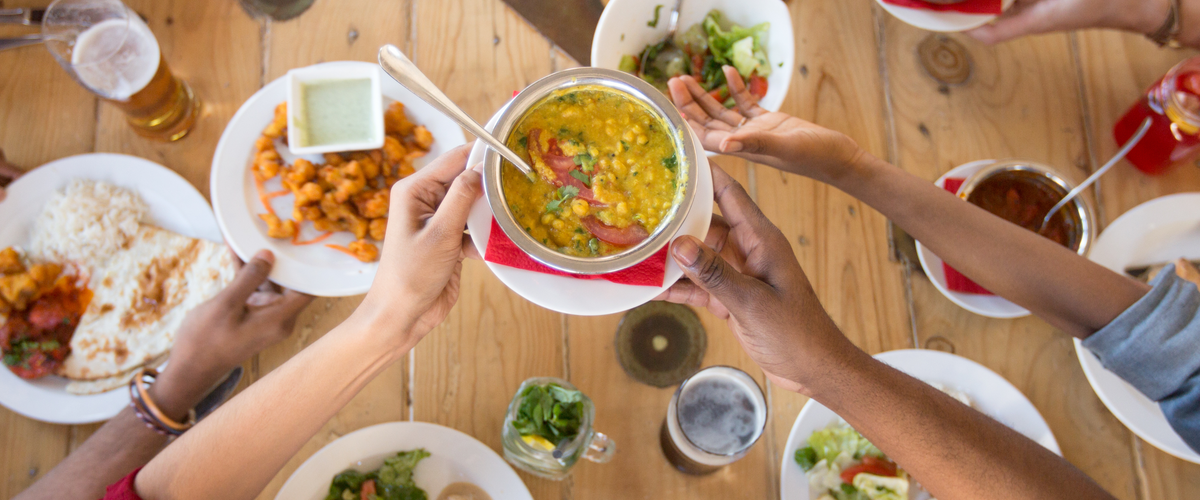Building—and sharing—a sense of home in a new land
By Louise Kennedy | Published July 2025
Toward the end of the pandemic, Babak Bina (MET’88, Parent CFA’25) thought it might be time to take a break. He’d been in the Boston restaurant business for four decades, scoring one groundbreaking success after another: the city’s first trattoria, first Persian restaurant, first enoteca. And he was still running multiple restaurants, leading an equine therapy nonprofit, participating in neighborhood associations he’d founded, serving on boards… It was a lot.

“And I thought, OK, this is crazy. I need to cut back,” he says. He and his wife, Coryn, bought a place on the beach in Miami and got ready to relax.
“But the universe had a different plan for me.”
A friend, the James Beard Award–winning chef Jamie Bissonnette, called to remind him that they had talked about doing business together sometime: “So what are we doing?”
“I said, ‘What do you mean, what are we doing?’ He said, ‘Well, you—this is what you said!’” He laughs, recalling the sudden about-face on his “slowing down” plans. “I’m a serial entrepreneur. So, you know, once you get the bug in this business you kind of can’t put a foot out.”
Bina got the bug early—while he was still studying business at MET. “BU was fun,” he says. “I met a lot of great friends, and to this day I have a couple of friends that I keep in touch with greatly.”
But it was also challenging. His family had come from Iran in 1979, “and we pretty much lost everything during the revolution,” he says. “As an immigrant, I was just trying to figure out what kids do in Boston. I just wanted to fit in. So I asked around.
“One kid said, ‘I go to Nantucket for the summer.’ I said, ‘Well, I don’t know where that is, but I’m not going to Nantucket.’ Another one was like, ‘I’m going to the south of France.’ Can’t go there anymore; don’t have a passport. And so on and so forth.”
Finally, one friend said he worked at his dad’s pizza place and restaurant every summer.
“And I said, ‘That sounds interesting. Can I come and do that?’ He’s like, ‘You’re really weird, but sure.’”
So Bina started, washing dishes, doing food prep, and performing other entry-level tasks, for $3 an hour when minimum wage was $3.50. “And I just kept working. I kept working in the restaurant business. And it actually kind of worked out.”
He pauses, looking back. His two sons are in college themselves now—Kamran at BU, Aidin at NYU—“and it makes you start thinking about your own past and where you were, what you did, who you were with. You remember things.”
Things like opening Azita Ristorante, the trattoria in the South End, with his sister chef Azita Bina-Seibel, when “trattorias didn’t exist in Boston and the South End was tumbleweeds.” Then “Lala Rokh on Beacon Hill, the first Persian restaurant of its kind in the world,” and Bin 26 Enoteca, the first such wine-centric establishment in town. Those three are now closed, but others remain: burger spot JM Curley, steakhouse Bogie’s Place, and the Wig Shop for cocktails.
There’s also a newer trio, in partnership with Bissonnette and Andy Cartin: the Temple Records bar, Sushi @ Temple Records, and Somaek, a Korean place that The New York Times recently placed on its list of the nation’s 50 best restaurants and a James Beard Awards semifinalist for Best New Restaurant in the country. And their latest venture: Zurito, which brings Basque cuisine to Beacon Hill.
“The common thread is hospitality,” Bina says, “making people feel like they’ve gone to someone’s home, that they are being hosted in our home.” It’s also about executing a concept that hadn’t existed here before, he says.
“And so that’s why I’ve never duplicated any of the concepts. It seems boring to me, although you’d make more money, just through repetition and a cookie-cutting sort of system, but that doesn’t seem exciting to me.”
Beyond excitement, there’s something deeper behind this impulse to make people feel at home, Bina says—though he finds it a bit hard to put into words.
“The revolution was devastating. We lost five generations of wealth and came here with our shirts on our backs, to a new culture, a new city, no friends,” he says. “And you know, these institutions, whether it was BU or then the restaurant community, my restaurant family, they protected me. They welcomed me—and in fact defended me, as the hostage crisis was going on. You know, I got beaten up, and they showed up and made sure that I got home safe.”
“And so I can’t underestimate the impact that the city has had on me,” Bina says. “And it means a lot to me. It’s been the fabric of my life.”
To see other businesses run by BU alumni, make sure to check out the BU Connects business directory.
